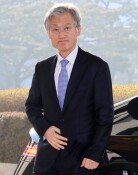[Op-Ed] The Underground Economy
[Op-Ed] The Underground Economy
Posted November. 04, 2009 08:47,
When a person has a headache after drinking, the authenticity of the alcohol draws suspicion. The National Tax Service says it cracks down on fake alcohol, but this is not easily eradicated. It introduced cutting-edge information technology in the distribution of alcoholic beverages to root out fakes. From last month, it is attaching electronic chips on the caps of alcohol bottles distributed to southern Seoul and authenticity and date of production of the beverages can be verified through cell phones. This system will be expanded all of Seoul and the country by 2012.
Few consumers would be duped if a chip that cost 250 won (0.20 cents) is embedded on the cap of an alcoholic beverage. If a bottle of alcohol is sold through an official channel, the cost of taxes including value-added, special excise and comprehensive income taxes is more than that of alcohol. Tax evasion is possible by selling fake alcohol or trading it without tax invoices. It is a no-brainer which choice bar owners want to make. The U.S. Internal Revenue Service classifies fake alcohol fall under the category of illegal underground economy, and alcohol transactions without the proper documents is dubbed as such.
The Korean alcohol market is worth around 540 billion won (456.4 million dollars) and reaches one trillion won (845 million dollars) per year if taxes are included.
Considering that 20 percent of the alcohol falls into the category of the illegal underground economy, 200 billion won (169 million dollars) worth of products are not taxed. In theory, one can calculate the entire underground economy consisting of areas such as fake alcohol, prostitution, gambling, narcotics, bribery and illegal tutoring. Ruling party lawmaker Cha Myeong-jin says the government can rake in 54 trillion won (45.6 billion dollars) in taxes from the underground economy valued at 270 trillion won (228.2 billion dollars), or 27 percent of the countrys annual GDP of 1,000 trillion won (845 billion dollars). In the 1980s when the U.S. was suffering from heavy fiscal deficits, some suggested a revenue increase by reducing the underground economy.
Edgar Feige, a professor emeritus of economics at the University of Wisconsin, defined the underground economy as all kinds of economic activities general official statistics cannot grasp. Under this definition, this includes illegal contracts that seek to pay less tax when buying a house or the unpaid work of housewives, not to mention fees paid to lawyers and doctors without receipts. Corrupt tax officials or the gallery of a high-ranking tax officials wife are also part of the underground economy. The National Tax Service said it will increase tax revenues from the underground economy. Hopefully, the war on the underground economy does not end in vain, but works effectively to reduce the burden of honest taxpayers.
Editorial Writer Park Yeong-kyun (parkyk@donga.com)





![[천광암 칼럼]장동혁은 대체 왜 이럴까](https://dimg.donga.com/c/138/175/90/1/wps/NEWS/IMAGE/2026/02/22/133399127.1.jpg)

